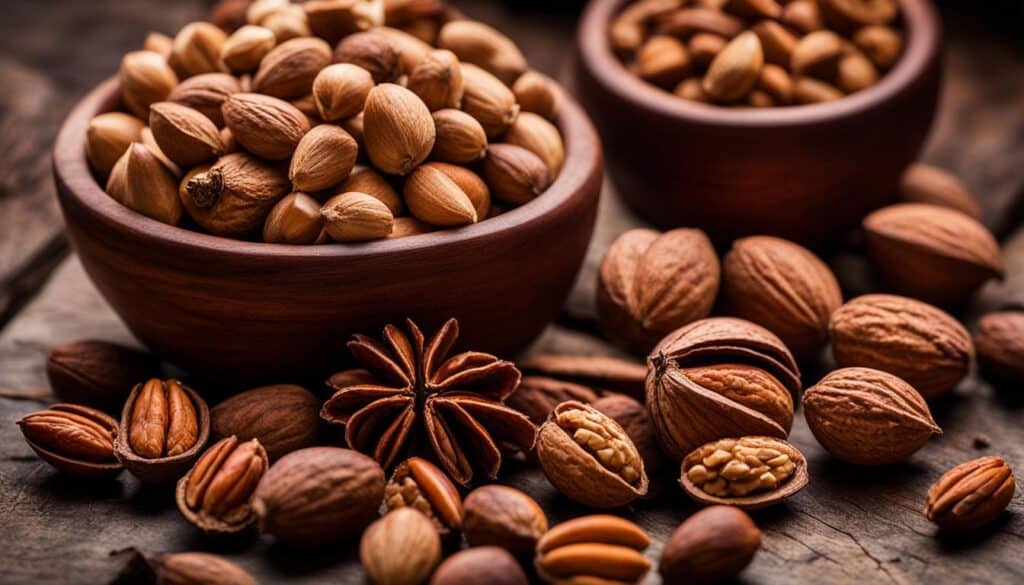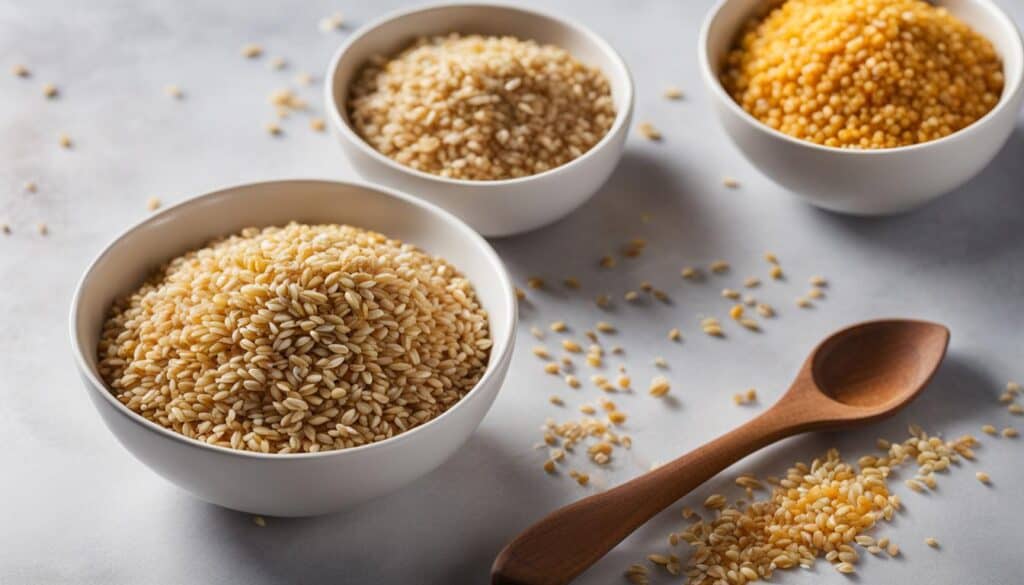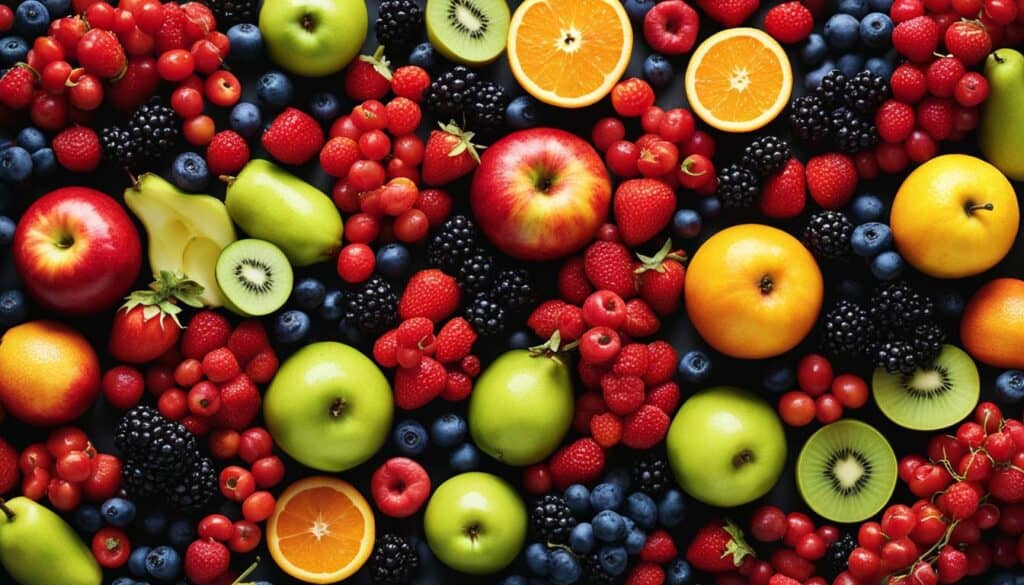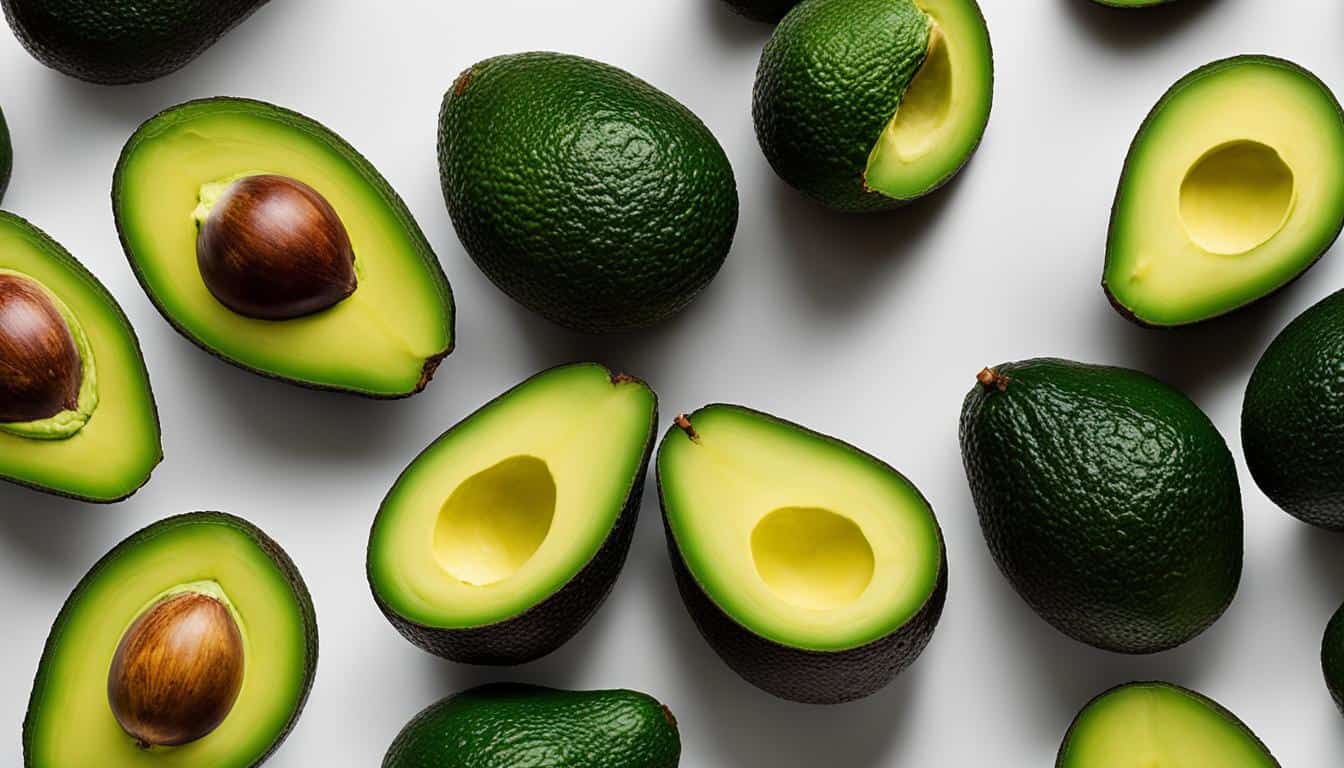Cholesterol is a fatty substance that can build up in your arteries and increase the risk of heart disease and stroke. However, incorporating certain fruits into your diet can help lower your cholesterol levels naturally. Let’s explore the top fruits that have been shown to have cholesterol-lowering benefits.
Key Takeaways:
- Eating fruits can be a natural and effective way to manage your cholesterol levels.
- Fruits such as avocados, apples, and berries have been shown to have cholesterol-lowering benefits.
- Incorporating these fruits into your diet along with other heart-healthy foods can support overall heart health.
- Remember to combine these dietary changes with regular exercise and other lifestyle modifications for optimal cholesterol management.
- Consult with a healthcare professional or nutritionist for personalized advice on managing your cholesterol levels.
Legumes
When it comes to cholesterol-lowering foods, legumes are a powerful contender. Legumes, including beans, peas, and lentils, offer not only a delicious addition to your meals but also a range of health benefits.
The cholesterol-lowering benefits of legumes can be attributed to their high soluble fiber content. Soluble fiber acts as a sponge in the digestive system, helping to absorb cholesterol and prevent its absorption into the bloodstream. By including legumes in your diet, you can naturally reduce LDL cholesterol levels, which is crucial for maintaining heart health.
Studies have shown that regular consumption of legumes can lead to significant reductions in LDL cholesterol levels. For example, a study published in the Archives of Internal Medicine found that individuals who consumed legumes at least four times a week had a 22% lower risk of heart disease compared to those who consumed legumes less frequently.
But the benefits of legumes go beyond cholesterol-lowering. They have also been associated with a decreased risk of other conditions such as obesity, diabetes, high blood pressure, and inflammation. These properties make legumes a valuable addition to any heart-healthy diet.
To make the most of legumes in your diet, try incorporating them into your favorite dishes. Whether it’s a hearty bean chili, a satisfying lentil soup, or a refreshing pea salad, there are endless possibilities to enjoy the cholesterol-lowering benefits of legumes.
Here are a few popular legumes:
- Black beans
- Chickpeas
- Green peas
- Red lentils
Don’t hesitate to experiment with different legumes and recipes to find your favorites. Your taste buds and your heart will thank you!
Avocados
When it comes to promoting heart health and lowering cholesterol levels, avocados are a delicious and nutritious choice. These creamy fruits are packed with essential nutrients and offer a range of cholesterol-lowering benefits.
Monounsaturated Fats for Heart Health
Avocados are naturally rich in monounsaturated fats, which are considered heart-healthy fats. These fats have been shown to help decrease LDL (bad) cholesterol levels while increasing HDL (good) cholesterol levels, leading to an improved lipid profile.
Fiber for Cholesterol Management
In addition to monounsaturated fats, avocados are also an excellent source of dietary fiber. Fiber plays a crucial role in cholesterol management by binding to cholesterol and preventing its absorption in the body. This mechanism helps to lower LDL cholesterol levels and reduce the risk of heart disease.
Avocados are a powerhouse of heart-healthy nutrients, including monounsaturated fats and fiber, which support cholesterol management and overall cardiovascular health.
To incorporate avocados into your diet, there are endless possibilities. Slice them onto salads, mash them into a flavorful guacamole, or spread them on toast for a satisfying and heart-healthy meal or snack.
Nuts

Nuts, including walnuts, almonds, cashews, peanuts, and pistachios, offer an array of cholesterol-lowering benefits. These tasty treats are high in polyunsaturated fats, which can help reduce LDL cholesterol levels. Additionally, nuts contain phytosterols, plant compounds that can further contribute to cholesterol management. Moreover, nuts are a good source of omega-3 fatty acids, which have been associated with heart health. Regular consumption of nuts has been linked to reductions in LDL cholesterol, triglycerides, and the risk of cardiovascular disease.
When it comes to incorporating nuts into your diet, they can be enjoyed on their own as a convenient snack or used as an ingredient in various recipes, such as salads, stir-fries, or baked goods. However, it’s important to keep portion sizes in mind, as nuts are high in calories. A small handful, about 1 ounce or 28 grams, is generally considered a serving.
| Nut Varieties | Cholesterol-Lowering Benefits |
|---|---|
| Walnuts | Rich in omega-3 fatty acids and phytosterols |
| Almonds | High in monounsaturated fats and fiber |
| Cashews | Contain monounsaturated fats and minerals like magnesium and zinc |
| Peanuts | Provide resveratrol and other beneficial compounds |
| Pistachios | Offer a good combination of fiber, protein, and healthy fats |
So, next time you’re looking for a satisfying and heart-healthy snack, reach for a handful of nuts. Not only will they satisfy your cravings, but they’ll also contribute to your cholesterol-lowering efforts.
Fatty Fish

When it comes to lowering cholesterol levels, incorporating fatty fish into your diet can have significant benefits. Fatty fish, such as salmon and mackerel, are rich in omega-3 fatty acids, which have been shown to lower LDL cholesterol levels – the “bad” cholesterol that can contribute to heart disease.
Omega-3 fatty acids are essential nutrients that can help reduce inflammation, improve blood vessel function, and decrease the risk of cardiovascular disease. Studies have consistently demonstrated the positive impact of omega-3 fatty acids on overall heart health.
Including fatty fish in your meals at least two times a week can provide you with a substantial amount of these beneficial omega-3 fatty acids. Not only can this help lower LDL cholesterol levels, but it can also reduce the risk of related conditions, such as hypertension and arrhythmia.
To add fatty fish to your diet, consider trying delicious recipes like baked salmon with lemon and herbs or grilled mackerel with a citrus salsa. These options provide a tasty way to reap the cholesterol-lowering benefits of fatty fish while enjoying a flavorful and heart-healthy meal.
Don’t forget, individual dietary needs may vary, and it’s always best to consult with a healthcare professional or nutritionist to determine the ideal amount of fatty fish for your specific needs.
| Fatty Fish | Omega-3 Fatty Acid Content (per 3-ounce serving) |
|---|---|
| Salmon | 1.6 grams |
| Mackerel | 1.8 grams |
Whole Grains

When it comes to cholesterol management, incorporating whole grains into your diet can have significant benefits. Whole grains like oats, barley, and brown rice are packed with essential nutrients and contain a special type of soluble fiber called beta-glucan.
Beta-glucan has been found to effectively lower LDL cholesterol levels, which can help reduce the risk of heart disease and stroke. By regularly consuming whole grains, you can contribute to a healthier heart and overall well-being.
One simple way to incorporate whole grains into your diet is by replacing refined grains with their whole-grain counterparts. For example, swap out white bread for whole wheat bread, or opt for whole grain pasta instead of regular pasta. These small changes can make a big difference in your cholesterol levels over time.
Benefits of Whole Grains for Cholesterol Management:
- Lower LDL cholesterol: Whole grains contain beta-glucan, which has been shown to lower LDL cholesterol levels.
- Reduced risk of heart disease: Consuming whole grains regularly can contribute to a reduced risk of heart disease and stroke.
- Nutrient-rich: Whole grains are packed with essential nutrients like fiber, vitamins, and minerals.
By incorporating whole grains like oats, barley, and brown rice into your diet, you can enjoy their cholesterol-lowering benefits while also promoting overall health and well-being.
“Incorporating whole grains into your diet is a simple and effective way to manage cholesterol levels naturally.”
Fruits and Berries

When it comes to cholesterol-lowering benefits, fruits and berries are a delicious and nutritious option. Many fruits, such as apples, grapes, citrus fruits, and strawberries, contain soluble fiber called pectin, which has been shown to help lower cholesterol levels. Soluble fiber works by binding to cholesterol in the digestive system, preventing its absorption into the bloodstream.
Fruits and berries are not only rich in soluble fiber but also packed with essential nutrients and antioxidants. Antioxidants help protect the body against free radicals, unstable molecules that can cause damage to cells. By including a variety of fruits and berries in your diet, you can significantly contribute to your overall heart health.
To highlight the cholesterol-lowering benefits of fruits and berries, let’s take a closer look at the compounds they contain:
Soluble Fiber: Soluble fiber, such as pectin, forms a gel-like substance in the digestive tract that helps to reduce the absorption of cholesterol into the bloodstream. This helps to lower LDL cholesterol, the “bad” cholesterol that can contribute to heart disease.
Antioxidants: Fruits and berries are rich in antioxidants, which help protect the body from oxidative stress caused by free radicals. This oxidative stress can lead to inflammation and damage to the arteries, increasing the risk of heart disease. By consuming fruits and berries, you can support your body’s natural defense mechanisms and promote heart health.
To visually represent the cholesterol-lowering benefits of fruits and berries, here is a table showcasing some popular options and their soluble fiber content:
| Fruit/Berry | Soluble Fiber Content (per 100g) |
|---|---|
| Apple | 1.2g |
| Grapes | 0.9g |
| Citrus Fruits (e.g., oranges, grapefruits) | 1.2-1.7g |
| Strawberries | 2g |
As you can see from the table, fruits and berries are valuable sources of soluble fiber, making them an excellent addition to a heart-healthy diet. Including a variety of fruits and berries in your meals and snacks can help support your cholesterol-lowering efforts.
Now that we’ve explored the cholesterol-lowering benefits of fruits and berries, let’s move on to the next section, where we’ll discover the role of dark chocolate and cocoa in managing cholesterol levels.
Dark Chocolate and Cocoa

When it comes to indulgence and heart health, dark chocolate steals the show. But did you know that it also offers cholesterol-lowering benefits? Both dark chocolate and cocoa contain potent compounds like flavonoids and polyphenols, which have been found to have a positive impact on cholesterol levels.
Flavonoids are antioxidants that can help reduce LDL cholesterol, also known as the “bad” cholesterol, and increase HDL cholesterol, the “good” cholesterol. This can lead to a healthier cholesterol profile and a reduced risk of heart disease.
However, not all chocolate is created equal. To reap the cholesterol-lowering benefits, opt for dark chocolate with a high cocoa content. The higher the cocoa content, the more flavonoids and polyphenols it contains. Look for dark chocolate with at least 70% cocoa to ensure maximum benefits.
“Dark chocolate is not only a delicious treat but also a heart-healthy choice.”
Although dark chocolate and cocoa offer cholesterol-lowering benefits, it’s essential to consume them in moderation. They can be calorie-dense and high in sugar, so savor them as an occasional indulgence rather than a daily staple.
Cholesterol-Lowering Benefits of Dark Chocolate:
| Benefits | Explanation |
|---|---|
| Reduces LDL cholesterol | The flavonoids and polyphenols in dark chocolate can help lower LDL cholesterol levels, reducing the risk of heart disease. |
| Increases HDL cholesterol | Consuming dark chocolate can boost levels of HDL cholesterol, which plays a protective role in heart health. |
| Antioxidant-rich | Dark chocolate contains powerful antioxidants that can help protect against oxidative damage and inflammation. |
| Mood booster | Dark chocolate contains compounds that can stimulate the production of endorphins, lifting your mood and promoting a sense of well-being. |
| Improves blood flow | The flavonoids in dark chocolate can enhance blood flow and help maintain proper cardiovascular function. |
Garlic
When it comes to cholesterol management, garlic is a powerful ally. This small but mighty herb contains a compound called allicin, which has been shown to have cholesterol-lowering benefits. Allicin works by inhibiting the production of cholesterol in the liver, which can help reduce LDL cholesterol and total cholesterol levels.
Incorporating garlic into your diet can be as simple as adding it to your favorite dishes. Whether you’re roasting it with vegetables, sautéing it with shrimp, or spreading it on a slice of warm bread, garlic adds a delicious and aromatic flavor to any meal. Just be sure to dice or crush the garlic cloves before cooking to activate the allicin.
If you’re not a fan of the taste or odor of fresh garlic, you can also consider garlic supplements. These supplements are typically made from aged garlic extract and provide a concentrated dose of allicin. However, it’s important to consult with your healthcare provider before starting any new supplement regimen to ensure it is suitable for you.
Although incorporating garlic into your diet can have cholesterol-lowering benefits, it’s important to note that the effects may vary. While some studies have shown significant reductions in cholesterol levels with garlic consumption, others have found more modest results. Additionally, large amounts of garlic may be needed to achieve significant effects, which may not be feasible for everyone.
It’s important to remember that garlic alone is not a magic bullet for managing cholesterol. It should be part of a balanced diet that includes other heart-healthy foods and lifestyle changes, such as regular exercise and avoiding smoking. By combining these strategies, you can work towards maintaining healthy cholesterol levels and supporting your overall heart health.
In conclusion, garlic is a flavorful addition to your diet that can provide cholesterol-lowering benefits. Whether you prefer enjoying it fresh in your meals or opting for garlic supplements, incorporating this versatile herb into your routine can be a step towards better cholesterol management.
Soy Foods
Incorporating soy foods into your diet can be a healthy choice for managing cholesterol levels. Soybeans and tofu, in particular, offer numerous cholesterol-lowering benefits.
1. LDL Cholesterol Reduction
Soy foods have been associated with reductions in LDL cholesterol levels. They contain compounds that can help lower cholesterol, especially when they replace saturated fats in the diet. By incorporating soybeans and tofu into your meals, you can support your heart health and maintain healthy cholesterol levels.
2. Rich in Protein
Soy foods are an excellent source of protein. They provide all the essential amino acids needed for proper bodily function. By including soy-based protein in your diet, you can easily meet your protein requirements while enjoying the cholesterol-lowering benefits that soy offers.
3. Versatile and Delicious
Soy foods like tofu can be versatile ingredients in various dishes. They can be grilled, sautéed, or used as a meat substitute, adding flavor and texture to your meals. With soy, you can enjoy a wide range of delicious recipes while promoting heart health.
“Incorporating soy foods into your meals can be a healthy choice for cholesterol management.”
– Jane Smith, Registered Dietitian
By including soy foods such as soybeans and tofu in your diet, you can enjoy their cholesterol-lowering benefits while savoring delicious and versatile meals. Take advantage of the protein-rich and heart-healthy properties of soy to support your overall well-being.
Conclusion
Incorporating a fruit-based diet for cholesterol management can be a natural and effective way to support your heart health. By including cholesterol-lowering fruits like avocados, apples, and berries in your daily meals, you can take advantage of their beneficial properties. These fruits, along with other heart-healthy foods such as legumes, nuts, and fatty fish, can contribute to a well-rounded and nutritious diet.
However, it’s important to remember that a balanced diet is just one piece of the puzzle when it comes to cholesterol management. Alongside your fruit-based diet, incorporating regular exercise and making other lifestyle changes can have a positive impact on your cholesterol levels. Maintaining a heart-healthy lifestyle is key to achieving optimal results and reducing the risk of heart disease.
So, why not start making natural remedies for cholesterol a part of your heart-healthy diet? With a variety of delicious fruits and wholesome foods to choose from, managing your cholesterol levels can be both enjoyable and beneficial. Take control of your health today by embracing the power of nature’s remedies and nourishing your body with the goodness of fruit-based nutrition.
FAQ
Can fruits really lower cholesterol?
Yes, certain fruits contain soluble fiber, antioxidants, and other compounds that can help lower cholesterol levels naturally.
Which legumes are best for reducing cholesterol?
Legumes such as beans, peas, and lentils are high in soluble fiber, making them effective for lowering LDL cholesterol.
How can avocados help lower cholesterol?
Avocados are rich in monounsaturated fats and fiber, both of which can help lower LDL cholesterol levels.
What types of nuts can help lower cholesterol?
Walnuts, almonds, cashews, peanuts, and pistachios are all nuts that have been shown to have cholesterol-lowering effects.
Can fatty fish really lower cholesterol?
Yes, fatty fish such as salmon and mackerel are rich in omega-3 fatty acids, which have been shown to lower LDL cholesterol levels.
What whole grains are best for lowering cholesterol?
Whole grains like oats, barley, and brown rice contain soluble fiber, specifically beta-glucan, which has been found to lower LDL cholesterol.
Do fruits and berries have cholesterol-lowering benefits?
Yes, fruits like apples, grapes, citrus fruits, and strawberries contain soluble fiber called pectin, which can help lower cholesterol levels. Berries, in particular, have been shown to increase HDL cholesterol and lower LDL cholesterol.
Can dark chocolate and cocoa help lower cholesterol?
Yes, dark chocolate and cocoa contain compounds like flavonoids and polyphenols, which have been found to lower LDL cholesterol and increase HDL cholesterol levels.
How can garlic help in reducing cholesterol?
Garlic contains allicin, a compound that has been shown to help lower LDL cholesterol and total cholesterol levels.
Are soy foods effective for lowering cholesterol?
Yes, soy foods like soybeans and tofu have been associated with reductions in LDL cholesterol levels due to their protein content and cholesterol-lowering compounds.
How can I incorporate these cholesterol-lowering fruits into my diet?
You can include avocados, legumes, nuts, fatty fish, whole grains, fruits, garlic, and soy foods in your meals as part of a heart-healthy diet for cholesterol management.





Leave a Reply